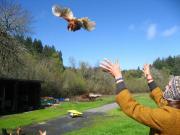This week, a lot has happened to me, both in real life and through the internet--- and via [[http://en.wikipedia.org/wiki/Amateur_radio|amateur radio - also known as ham radio - communities]].
I think the world of [[http://www.arrl.org/ham-radio-history|ham radio]] is something of interest to Casa people, even and especially, as nomads. It could also be helpful for the Danube raft project, for example, when for vast stretches of time there may be no access to internet.
For now, I'm re-posting some things from e-mails that my friend [[http://www.noshortageofwork.com/|Brooke]] shared with me -- first about a famous long-distance ham radio traveler/operator, and second about ham radio, itself, and why we should learn & use it:
*
In 1954, inspired by the 1947 book Kon Tiki, [[http://www.netcore.us/sk/VP2VBa.htm|Danny Weil]] left England in a boat he made himself to circumnavigate the world alone. He learned the Morse code and radio theory and got a ham license. He set up his radio on numerous tiny islands and talked with over 100,000 hams all over the globe. We think of him as the first “DXpeditioner.” ([[http://www.dxpub.com/|DX]] is the Morse code abbreviation for long distance.)
[[http://www.Yasme.org|The Yasme Foundation]] (named after Danny’s boat) was set up to fund expeditions that involved ham radio, and one couple, Lloyd (W6KG) and Iris (W6QL) Colvin became their primary DXpeditioners, operating from over 100 countries and amassing over 1 million contacts.
*
In 1966 at the age of 14, way before computer nets of any kind, I joined a similarly amazing technology-driven community. After school I would talk to people all over the world and had exchanged postcards with thousands by the time I’d graduated high school. Mostly we talked about ourselves, or worse yet, our equipment, but every so often something important happened and we needed to help each other, like when the Soviets invaded Czechoslovakia or Nicaragua had an earthquake.
We were about a million strong then and we could look each other up in a book that listed our address and government issued call signs. We were a community – and we trusted each other. And we still do, only we’re much stronger.
When I was a hitch-hiker in the 1970’s there were no cell phones or internet and 911 was just beginning. But I carried a small ham radio with me and if I ever really got in trouble, I’d put out a call to the ether, and a complete stranger would come and help me – someone I could trust and who trusted me.
It is an amazing, multi-faceted hobby. And a load of fun.
It fits in perfectly with travel, especially the kind you do. If you listen to the [[http://dokufunk.org/upload/weil.mp3|audio interview of Danny Weil]] (and I just did for the first time last night and all I can say is "wow."), I think you'll hear the voice of someone who built a life-long lifestyle around our hobby that you could imagine emulating in your own way.
It offers a pay-it-forward opportunity. I've provided relief communications help during the Nicaraguan earthquake, and I've flown into Haiti seven times re-equipping hams after 22 years under Papa Doc when our hobby was illegal. These were vastly more soul-satisfying experiences than my typical days vagabonding.
Although we're fairly hidden from view, hams are everywhere. Case in point: This morning, coming into work on my commuter train, I ran into another contester I've met only twice in person (WV2ZOW) who has been following this thread, so we talked about you. We also talked about the possibility I might go back to Costa Rica at the end of November for another contest, and he might join me.
I think you'll see that, like with Couch Surfers, hams have formed an amazing community around a common interest in communications.
We're different in that we have a higher barrier of entry; you must first pass a test. This serves a useful purpose in that it weeds out the riffraff, and it almost guarantees trustworthiness.
That test is an easy one for those, like you, who are accustomed to learning new things - no harder than a college mid-term. And, no matter where you land on this planet, I am confident I can find a fellow ham who will gladly show you our hobby and tutor you for the test.

Comments
welll.... we were supposed to
welll.... we were supposed to have an introduction in one of the ham radio labs of a local Gran Canarian, but the meeting never wound up happening in the end. Still an interesting project to keep in mind.
my dad is a big ham radio
my dad is a big ham radio guy, as a pilot and sailor for the last 60 years.
I tried to call him on Ramble, mid atlantic crossing, but the 'bounces' from there to australia were too big, it was too far away for the waves to get through. You can do relays though, where someone half way passes on the message.
Pretty sweet i guess :)
Sounds really like ... yes!
It is amazing always to think things are 'new', and then to discover they are yet another layer and scale of the 'same-old thing': sharing & community ;-)
I used radio when I was a child a lot, but never got this far. I should ask my dad about it and try to find radio-amateurs here in Amsterdam and get them over to talk about it maybe. Maybe Brooke knows someone?
Hey, but what about your own experience with this radio on the island you're currently at?